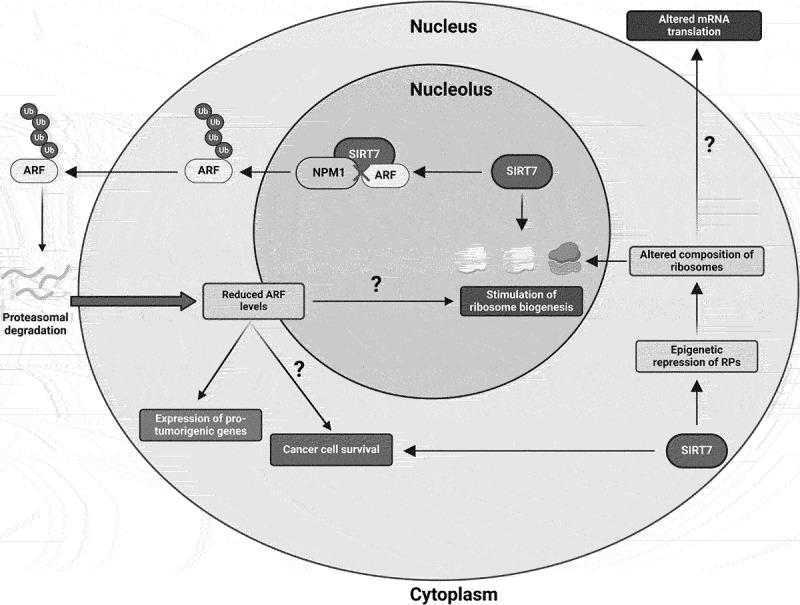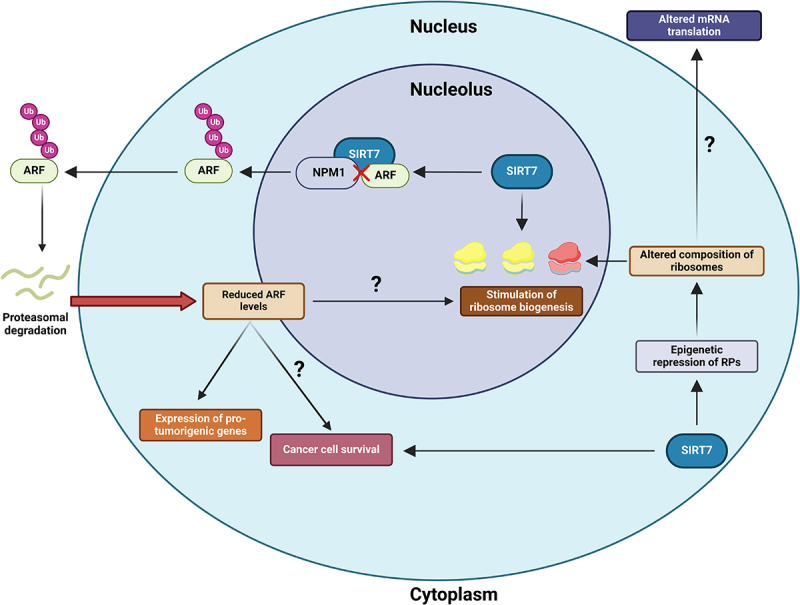The SIRT7-nucleolus connection in cancer: ARF enters the fray.
IF 1.9
Q3 ONCOLOGY
Molecular and Cellular Oncology
Pub Date : 2024-07-17
eCollection Date: 2024-01-01
DOI:10.1080/23723556.2024.2381287
引用次数: 0
Abstract
The nucleolar enzyme sirtuin 7 (SIRT7) promotes cancer progression in certain malignancies, likely in part by controlling ribosome biosynthesis. Recently, we discovered that SIRT7 destabilizes the cyclin dependent kinase inhibitor 2A (CDKN2A, known as ARF) within the nucleolus, aiding cancer progression. We propose that targeting nucleolar SIRT7 offers promise for new anti-cancer therapies.


癌症中 SIRT7 与核仁的联系:ARF 加入战局
在某些恶性肿瘤中,细胞核酶sirtuin 7(SIRT7)会促进癌症进展,部分原因可能是它控制了核糖体的生物合成。最近,我们发现 SIRT7 会破坏细胞核内细胞周期蛋白依赖性激酶抑制剂 2A(CDKN2A,又称 ARF)的稳定性,从而帮助癌症进展。我们认为,以细胞核 SIRT7 为靶点有望开发出新的抗癌疗法。
本文章由计算机程序翻译,如有差异,请以英文原文为准。
求助全文
约1分钟内获得全文
求助全文
来源期刊

Molecular and Cellular Oncology
Biochemistry, Genetics and Molecular Biology-Cancer Research
CiteScore
3.20
自引率
0.00%
发文量
18
期刊介绍:
For a long time, solid neoplasms have been viewed as relatively homogeneous entities composed for the most part of malignant cells. It is now clear that tumors are highly heterogeneous structures that evolve in the context of intimate interactions between cancer cells and endothelial, stromal as well as immune cells. During the past few years, experimental and clinical oncologists have witnessed several conceptual transitions of this type. Molecular and Cellular Oncology (MCO) emerges within this conceptual framework as a high-profile forum for the publication of fundamental, translational and clinical research on cancer. The scope of MCO is broad. Submissions dealing with all aspects of oncogenesis, tumor progression and response to therapy will be welcome, irrespective of whether they focus on solid or hematological neoplasms. MCO has gathered leading scientists with expertise in multiple areas of cancer research and other fields of investigation to constitute a large, interdisciplinary, Editorial Board that will ensure the quality of articles accepted for publication. MCO will publish Original Research Articles, Brief Reports, Reviews, Short Reviews, Commentaries, Author Views (auto-commentaries) and Meeting Reports dealing with all aspects of cancer research.
 求助内容:
求助内容: 应助结果提醒方式:
应助结果提醒方式:


